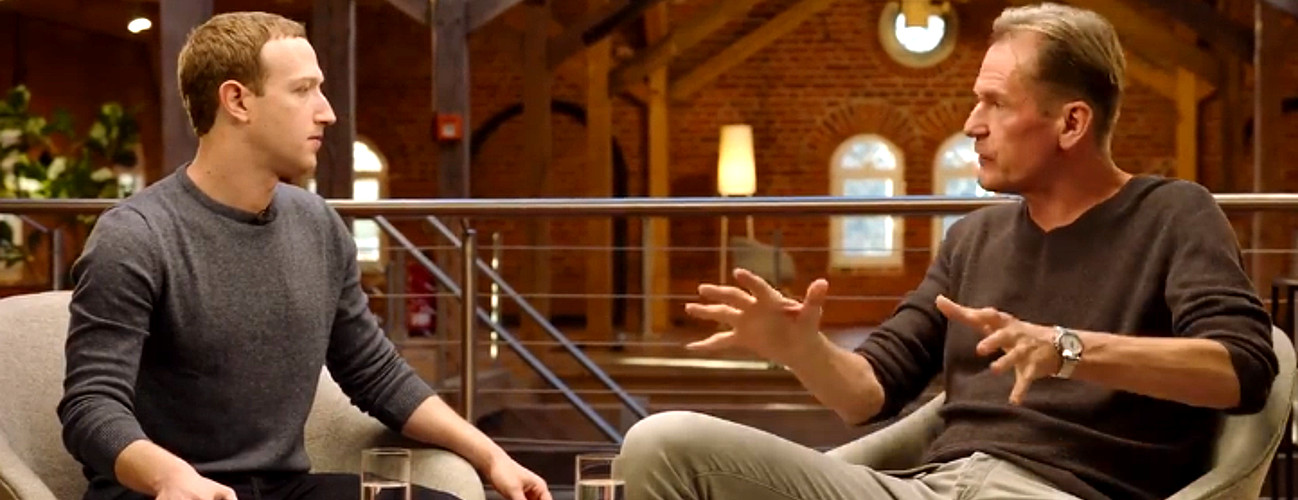Sign up for the daily CJR newsletter.
Facebook appears to be mounting something of a charm offensive lately. A commitment to fund journalism to the tune of about $300 million over the next three years was followed on Saturday by an op-ed from CEO Mark Zuckerberg in The Washington Post suggesting ways in which the giant social network could (and should) be regulated. And, on Monday, the Facebook co-founder revealed in an interview with Mathias Döpfner, the CEO of German publisher Axel Springer, that he is considering paying news publishers for their content, something Döpfner and others—including News Corp. Chairman Rupert Murdoch—have been calling for for years. Is this a genuine attempt to help media, or another part of a long-running PR campaign by a company desperately afraid of getting caught on the wrong side of antitrust legislation?
What exactly a dedicated news section (or “surface” as Zuckerberg insists on calling it) would look like remains unclear. Much of the conversation with Döpfner is vague: the Facebook CEO says how much he cares about quality news, and the Axel Springer CEO repeatedly asks him to pay for it, citing the recently adopted EU copyright directive known as Article 11, which entitles publishers to charge platforms a so-called “snippet tax” for using their content. Zuckerberg suggests that, while users want news on the platform, they don’t necessarily want their News Feeds to be clogged with stories. It sounds as though Facebook is considering a standalone tab or section that contains “quality news,” which, according to a report from Recode based on anonymous sources at Facebook, might be selected by human editors instead of an algorithm. (Coincidentally, perhaps, Apple launched its News+ subscription service, which is also powered by human editors, last week.)
Facebook has tried multiple versions of similar features in the past. For example, in 2017, after the company said it was de-emphasizing news in the News Feed (because most users said they didn’t want them there), it experimented with a separate, standalone tab for news. It turned out to be a very short-lived experiment, for two related reasons: virtually no one went there, and publishers complained bitterly that their traffic from Facebook declined sharply. Zuckerberg told Dopfner he was willing to consider showing users news even if they hadn’t already chosen to follow or share stories from those providers.
Facebook has experimented with a number of different ways of paying publishers for content, including Instant Articles, the mobile-focused feature that optimizes articles for smartphones and distributes them through the Facebook app. Although some publishers continue to work with the company, others have complained that Facebook doesn’t give them enough traffic or advertising revenue in order to make it worth their while, so many have decided to support Google’s competing AMP (Accelerated Mobile Pages) effort instead.
Facebook also paid a select group of news publishers to create short-form video not long ago, including The New York Times, BuzzFeed, and CNN. That effort also ended with a whimper, after many companies geared up new video units to produce such material only to find that Facebook had no plans in place to share any kind of revenue with them. The company’s focus then shifted to Facebook Watch, its portal for longer-form video, where it also started paying publishers to create content. Facebook’s video push was been criticized, as well, for shifting gears or moving goalposts multiple times; the cost of creating Facebook-specific content has been cited in the demise or sharp decline of multiple digital news outlets, including Mic.com.
Even the practice of selecting news headlines using human beings instead of (or in addition to) algorithms has an ignominious history at Facebook. At one point, the company had a feature called Trending Topics—an attempt to compete with the breaking news environment of Twitter—and items in that section were selected in part by human editors. But a Gizmodo article about alleged anti-conservative bias on the part of these editors triggered a firestorm of criticism that eventually led to Zuckerberg appearing before Congress. The human editors were fired and the entire feature was eventually killed in June of last year. Even after it was dead, the Facebook CEO went out of his way to meet with right-wing commentators and spokesmen, in an attempt to reassure them that Facebook wasn’t biased.
Given this background, it’s hard to see Zuckerberg’s latest musings about a standalone news feature as anything more than an attempt to repackage some of the things that have already either failed badly or continue to limp along without making much of an impact either on the industry or on Facebook’s bottom line. The company knows that it is still in the eye of a storm when it comes to its role in distributing fake news, so it might be hoping that any effort made to even try to select “quality” news would be seen favorably by regulators and some journalists. It has already taken a few (controversial, naturally) steps down the road by announcing last year that it was going to survey users and assign trust rankings to news publishers. (It quickly became clear that the concept of user-assigned “trust” as it applies to news companies is fraught with complications—plenty of people seem to trust Breitbart News, for example).
Some publishers, including Axel Springer, might be satisfied to get some money from Facebook for their content (which, according to Recode, might take the form of ad revenue sharing rather than direct payments). But in return for what could be a pittance of payment—given the fact that traffic to this new feature might be slim—is it worth giving Facebook even more control over your content? Zuckerberg’s latest announcement, ultimately, reinforces how powerful Facebook is—even if you don’t think it’s a great deal, you probably have to go along with it anyway.
Has America ever needed a media defender more than now? Help us by joining CJR today.







